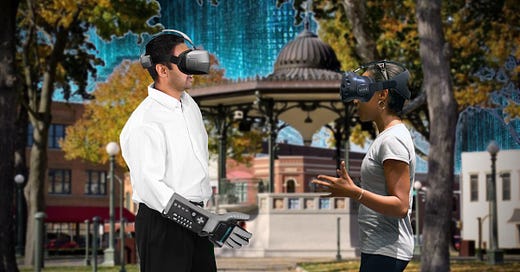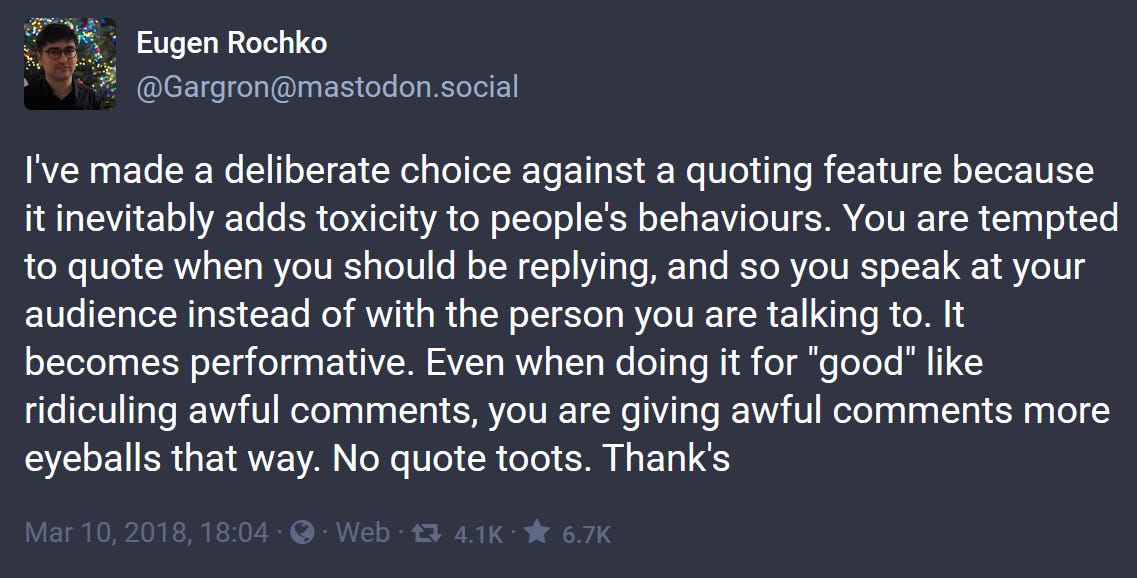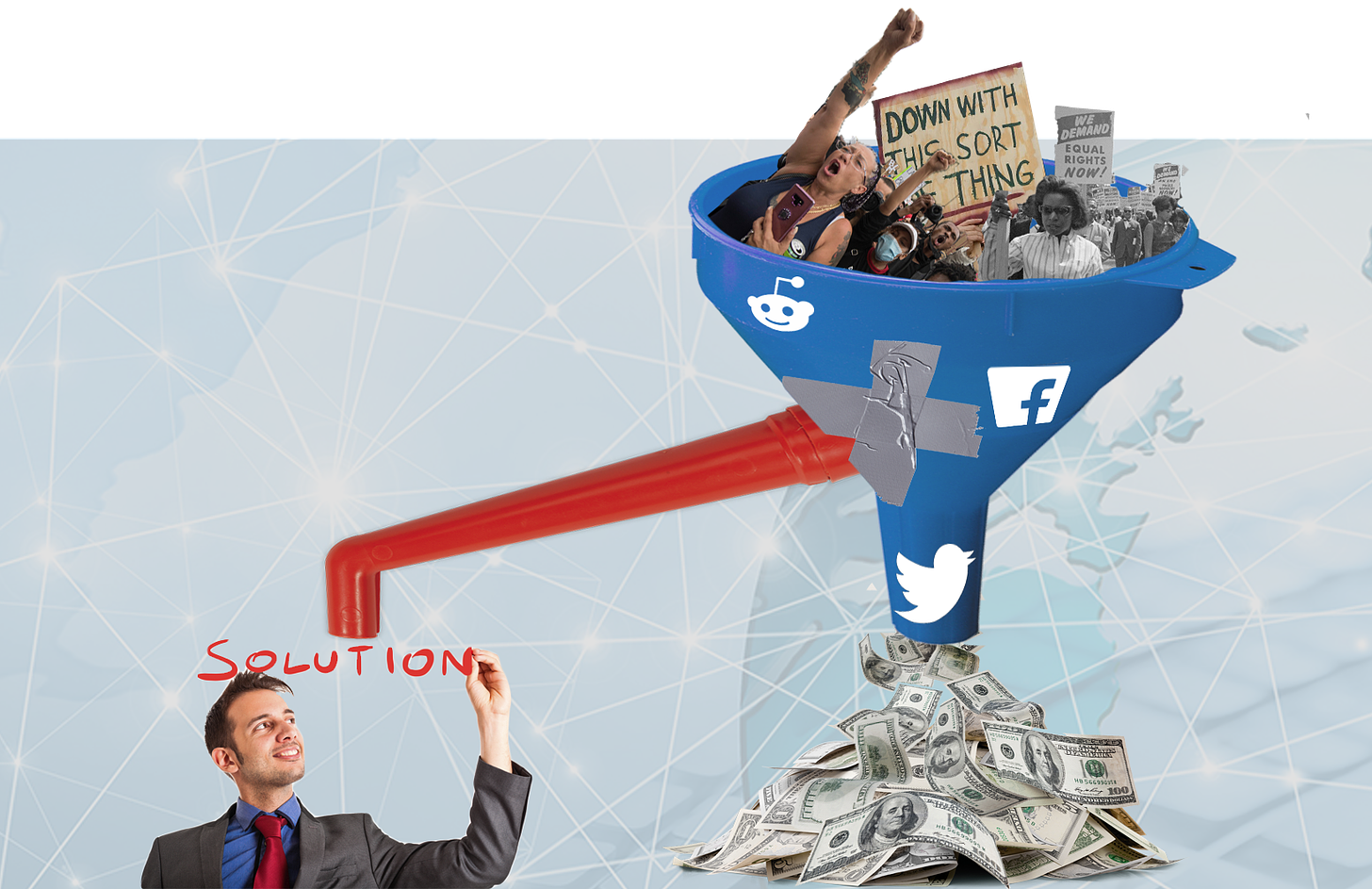“A culture's ability to understand the world and itself is critical to its survival. But today we are led into the arena of public debate by seers whose main gift is their ability to compel people to continue to watch them.” ― George Saunders, The Braindead Megaphone
One department in which I think digital communication platforms have massive potential, is in the facilitation of constructive political discussions. Right now, discussing politics on social media is the single most efficient way to both upset yourself and accomplish nothing. It’s actually remarkable how efficient it is! The platforms are just not designed for constructive communication. But what if one was? What if a platform could somehow harness all that passionate energy, and turn it into something other than more dollars for billionaires?
As I’ve written recently, I think the future of text-based social media lies in a variety of decentralized, diverse and interoperable platforms, as opposed to the “big tents” like Twitter, sometimes “with littler tents inside them” like Facebook and Reddit. Online communities with deliniative rules and well-articulated goals can be pretty good at achieving those goals. So I wondered: could a place exist that encourages constructive political conversation without infringing upon free speech?
The Problems:
For-profit social media discourages empathetic reactions while encouraging performative “othering”.
One positive thing social media is exceptionally good at, is giving users a peek into the lives of other people who live very differently. Peeks like this, no matter how trivial, can serve as starting points to bridge cultural divides, and therefore- increase empathy. For example: Remember the infamous “30-50 feral hogs” tweet about assault rifles?

That guy was mostly dunked on (because that’s how Twitter was built to function) but if you’re like me, he also introduced a concept I’d never considered. “Feral hogs charging through one’s yard” is apparently a thing some people could have happen to them! Crazy!
Thanks to Twitter, I have a more nuanced understanding of what life in America can look like. I had never considered that 30-50 hogs (feral or otherwise) was even an option on the list of things that can run through yards. Now- is easier access to assault rifles a reasonable approach to this situation? I have no clue. Willie McNabb seems to think so. But the merits of his argument are beside the point I’m addressing, which is the predictable “conversation” that followed Willie’s viral tweet consisting primarily of mockery and low-effort jabs. Because, again, that’s the content Twitter encourages.
It would be nice to have a place where perspectives could be expressed earnestly, and received earnestly. A place where people wouldn’t feel a need to exaggerate to be taken seriously and respondents wouldn’t be dismissive of lived experiences vastly different to theirs.
For-profit social media cannot reliably reflect reality to a degree necessary for democracy to function.
In 2011, Twitter and Facebook were majorly credited with helping organize the pro-democracy protests known as the “Arab Spring”. Their accessible and easy-to-use platforms enabled people without much power or influence to share their lived experiences and organize in a place outside of the grasp of their restrictive governments. I don’t want to imply that there was no propaganda posted during that time, or that what the outside world saw on Twitter perfectly represented what was happening in the streets, but the point is that (for the most part) reality won the game of attention back then, and having this knowledge of reality gave otherwise unempowered people some tools, and therefore some hope, for a chance to improve their lives.
But a mere four years later the narrative flipped. In 2016 Twitter and Facebook were no longer the thing that was permeating the information shroud of more restrictive societies, but a thing that was enabling them. These platforms went from shining a light on truth, to obfuscating it in a sea of untruth. Reality was still there on Twitter and Facebook, but it was awash in so much non-reality that it was becoming harder and harder for the average user to efficiently distinguish reality from propaganda.
On platforms engineered to catch attention, the thing that catches attention best wins. True or not, posted in earnest or not. Fake news spreads because enough people want it to be true. Anger is addictive, and social media companies exploit that to make money. In democratic countries, the political result of this toxic stew, is a polarized landscape in which citizens do not believe their compatriots are interested in solving problems together. The same technology that helped democratize access to reality, and empower the disenfranchised was now being used to restrict it by making the effort required to differentiate truth from untruth too difficult (and boring) for a human brain to efficiently process.
Imagine if email had never developed spam filters in the early aughts. Those of you old enough might remember how bad spam was getting before companies like Gmail came around with their automatic spam filters. Imagine how unusable email would be today if for every real message you also got 100 fake ones. Even if the spam emails were obviously spam (which they’re usually not) you’d still have to manually sort through them all just to find what’s real. It’s just too much work for most people. That’s essentially what we have today on social media. There’s reality, but there’s also a lot of stuff trying to pretend it’s reality. Spam and misinformation are only going to get worse when access to automation software that can efficiently fake being human (think: ChatGPT) become more widespread.
A natural result of living with uncertainty, is that after a while people will recede into cynicism (“I give up on trying to understand”), or tribalism (“I will follow a group that decides for me”). These “me/us vs the world” mentalities can be cancerous to democratic systems which require an educated (and participatory) populace to find common ground.
There is no efficient method for agencies and policy makers to speak directly to the citizenry without going through a for-profit third party algorithm.
Most Americans don’t even know the name of their local representatives, let alone the projects being worked on in their neighborhoods. Sure, many representatives have websites outlining what they’re doing, but there’s no way to easily follow what’s relevant in a “feed” like format, all in one place. Most people are just too busy to keep on top of everything going on that might be relevant to them.
Furthermore, it’s unreasonable that (for example) something like say- a timeline update on bridge repair in small town USA has to compete for attention in the same “news” feed as the latest Kardashian gossip. When the most sensationalist stories are favored by the algorithms, it means that politically ambitious people who like attention will have no choice but to become more sensationalist to keep up.
Wouldn’t it be nice to have an app or website that gave you direct access to everyone representing you in government, provided (algorithm-free) updates from them, and allowed you to openly discuss (with officials and neighbors) issues relevant to your community?
There’s no reason press releases and official statements from leaders and agencies should have to be filtered through the algorithms of Facebook and Twitter alongside everything else1. Citizens could greatly benefit by having everything relevant to them in one easy-to-access place.
The thought experiment:
Is it possible for social media and a free society to coexist? In its current attention-into-dollars form, I don’t believe both can survive. I wanted to know: how might we utilize the best parts of the technology while preventing its abuse and misuse? Consider what might a social media network look like that has the following traits:
Enables the sharing, discussion and critique of political policy on a local to federal level.
Gives an equal voice to everyone regardless of status or influence.
Encourages clear, concise and efficient language.
Encourages good-faith debate and taking the lived experiences of one another seriously.
Discourages the sharing of propaganda, advertising, and fake news.
An idea I came up with was this:
What if a government agency (or a public nonprofit, etc etc) ran a twitter-esque social media website? Sounds absurd right? I mean, probably. And feel free to challenge it in the comments. But hear me out first! This is what I think it could look like:
1. Every (adult) citizen gets one account associated with their person.
Like registering to vote, to register an account, you’d fill out a form online (or at the DMV or whatever) with documentation verifying your identity. Usernames don’t have to be the persons’ name, and can be anonymized if desired, to protect those who fear backlash from friends and family. Like voting, participation should be:
Easy to figure out.
Accessible to the disabled.
Purely voluntary.
2. “Tweets” are limited to ~600 characters.
600 characters is about three times what Twitter allows today. Short enough to force posts to be concise and encourage a single topic, long enough to make room for nuance.
3. Every user gets one “tweet” per day.
It can be a regular “tweet”, a “retweet” or a reply
No “quote tweets”, for the same reason Mastodon doesn’t:
The reason for one-post-per-day is multi-part:
Users would be encouraged to choose their words more carefully and accurately instead of going for the usual maximum clickbait “starter” tweet.
Back-and-forth debates would require each participant to “sleep on it” before responding, keeping the temperature cooler.
Feeds will be less likely to get “too big to read” and can be scrolled to the end.
In short: fewer posts means less garbage to sort through. Even if someone you follow regularly exercises their constitutional right to lie through their teeth, it can still only be done once per day. Furthermore, the “firehose” tactic of spreading spam and political misinformation with overwhelming quantity will be much more difficult to execute without the widespread cooperation of individuals.
4. No ads
Funding is the part I admittedly know the least about. There are obvious conflict of interest issues if ads were permitted, but corporate underwriting (à la NPR) could be an option. As well as the publicly funded Corporation for Public Broadcasting.
I imagine (like with NPR or Wikipedia), if the public sees value in the site, donations could eventually play a significant part too.
Moderation costs would likely be cheaper than on a site like Twitter. Both because A) if all legal speech is permitted, there’s not much to remove, and B) even if every Adult American citizen posted every single day, a very unlikely scenario, it would still be less than half the daily posts on Twitter2.
Potential Criticisms:
It won’t stop people from arguing: As far as I know, arguing, often bitterly, has always been a part of democratic politics and likely always will be. The question is not how to stop the arguing, but how to best ensure that the arguers have an opportunity of reaching a mutual resolution. When “debaters” aren’t face to face it’s very easy to forget your opponent’s humanity. Give someone unlimited, anonymized access to communication tools, and it’s very unlikely they will ever face a need to look inward.
It won’t stop bad faith arguments: The idea of a public-utility social network is not to “fix politics”, only to nudge it away from the zero-sum trend it’s been moving towards since *checks notes* oh interesting- around the same time the internet became mainstream.
Feature ideas:
A option to automatically follow all of your representatives, down to the local level.
Some kind of “subject line” or hashtag-style system for categorizing conversations.
A “top posts in your neighborhood/zip code/county” to find discussions.
Fediverse integration? Just spitballin’ here.
Things I haven’t figured out:
How to reliably prevent impersonations. For example: if someone steals a password, or takes over an account from a dead/elderly relative, they are essentially doubling their daily post count.
How to discourage surreptitious “influencer advertising” ie: growing a following primarily for the promoting products (and/or other means of cynically engaging with a platform).
So, why would anyone use this?
When it comes to Twitter users in particular, I’ve always wondered if most of them were actually interested in discussing ideas, or if they mainly just wanted to fight and argue. There is an addictive quality to fighting, and Twitter certainly capitalizes on that. But I can’t imagine that most people, given an opportunity, would prefer to yell into “the-void-that-yells-back” which is social media, as opposed to channeling that energy into something more constructive.
The question is: do the people “debating politics” on social media really want to problem solve? Or are they just venting frustrations? It’s hard to say. But I suspect that anyone who is trying to problem solve, is quickly running into a frustration-venter uninterested in genuine solution-seeking and becoming frustrated themselves.
But asking “how big would the user base be” is also beside one of my major points, which is that there’s currently no place on the internet to talk politics with a remote hope of a fruitful conversation even if one wanted to. There’s a fair amount of political strategizing, to be sure, but not a lot of the common-ground-seeking that’s needed when sharing a country with people with radically different worldviews.
I think we can all acknowledge that despite every politician and journalist having a presence on Twitter, it’s an unproductive place for compromise, nuance or big-picture solutions. No matter how much one may dislike the “other side” we still have to live (and compromise) with each other. It’s my hope that if a public place existed, that nobody owned, perceptions of inherent or algorithmic bias could be dismissed.
As I’ve recently written, in the right hands I’m very optimistic that the tools that comprise “social media” can be used to elevate the mind and spirit of everyone, especially the global citizens who have historically been denied easy access to educational and creative resources. The idealistic aspirations of the early Web were to democratize information, and I think, generally, it’s done a lot of that. We’re also learning that the Web can democratize culture as well, something I don’t think many people considered when it was new. Ultimately a hundred years from now I think we’ll consider that cultural aspect to be the biggest impact the invention of “computers talking to each other” has had on society.
There’s a lot of energy being expended from a lot of very passionate people out there who are genuinely trying to improve the world as they see it. But right now, most of that energy is serving to fuel advertising machines who’s output is dollars. Perhaps if some of us work together we can funnel a little of that energy into a machine designed to output solutions instead.
I’ve (sort of) transformed my old Instagram account into a community news feed (dare I say, it’s actually somewhat of an overall positive experience now?) you can see the steps I took here. (I should mention that I only check in PC web browser with an ad blocker enabled.)
Twitter is perhaps not the best platform to compare against when it comes to effective moderation, but you get me.







